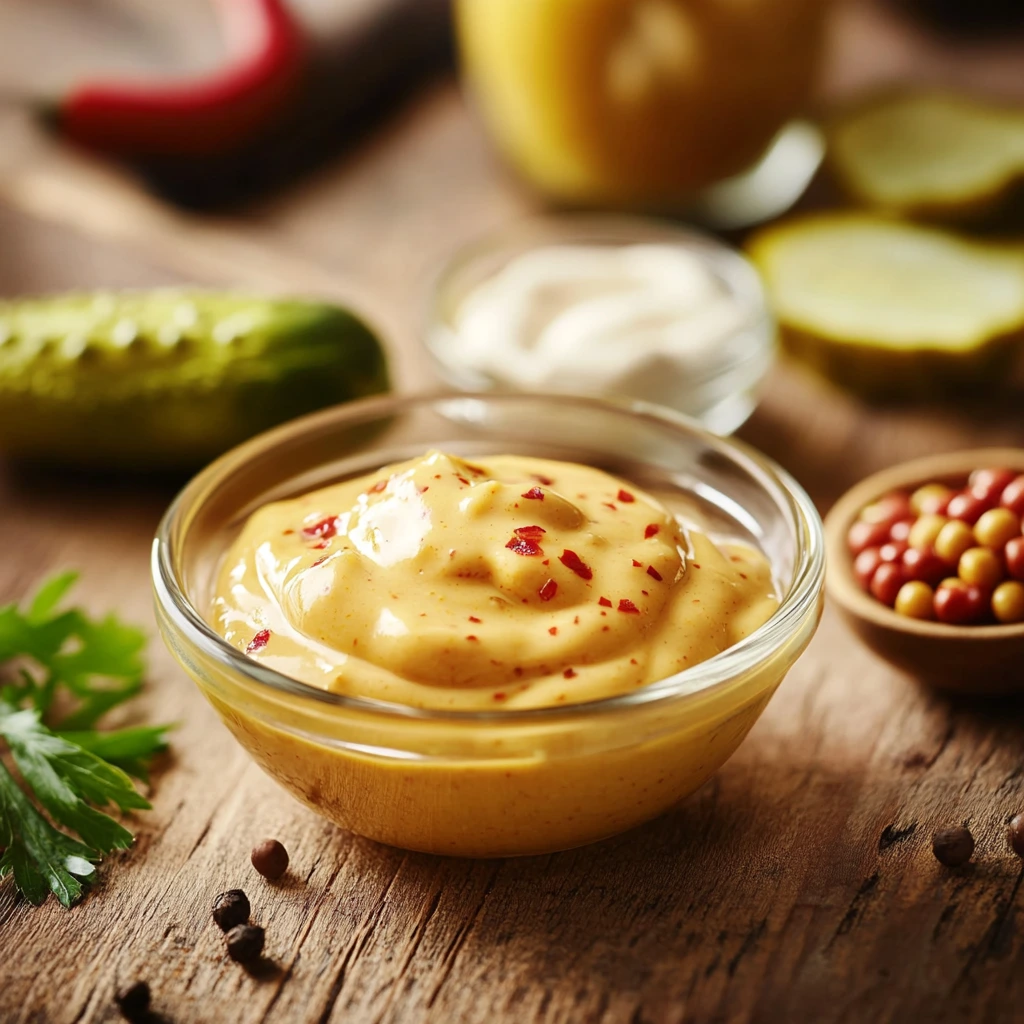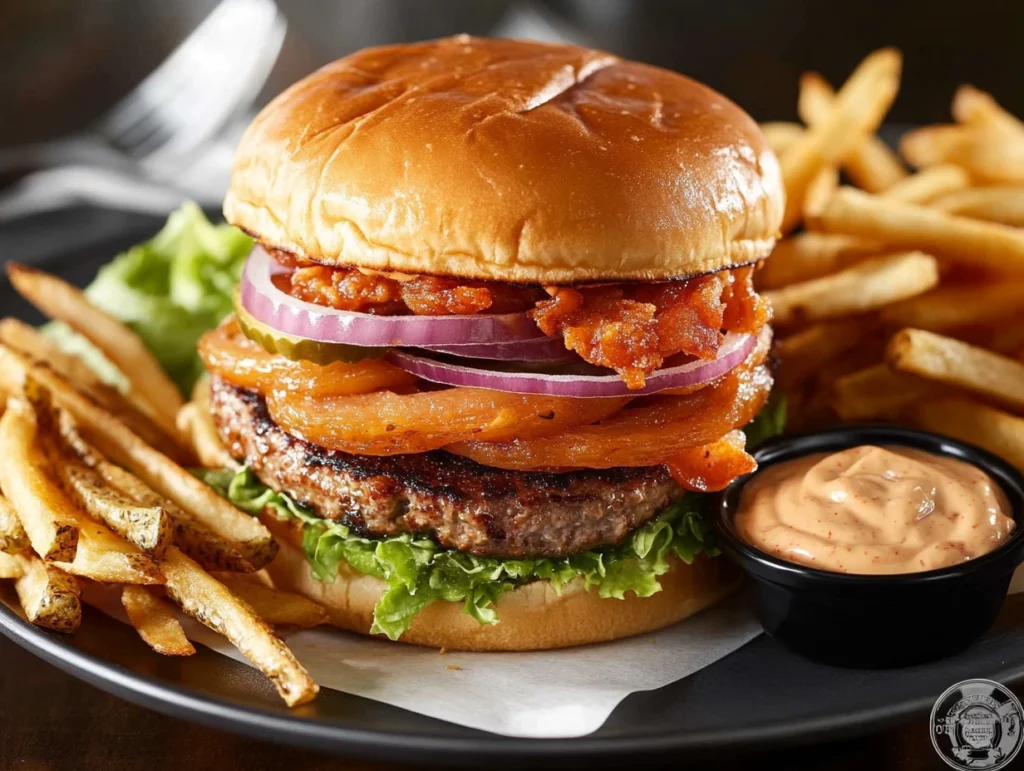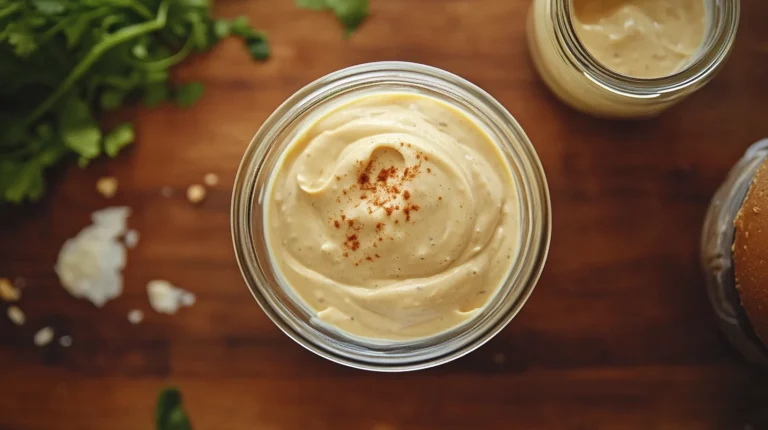Introduction and Basics of Burger Sauce
When it comes to crafting the perfect burger, nothing completes the experience like a delicious homemade burger sauce recipe. This flavorful condiment combines creamy, tangy, and savory elements to elevate any burger, taking it from ordinary to extraordinary. Whether you’re hosting a backyard barbecue or preparing a quick weeknight dinner, mastering the art of a burger sauce recipe will enhance your culinary skills and wow your guests.
A burger sauce recipe is not just an afterthought; it’s the bridge between textures and tastes that brings a burger to life. Whether you’re hosting a backyard barbecue or enjoying a gourmet burger at your favorite restaurant, mastering a burger sauce recipe ensures you have the perfect complement to enhance flavor. In fact, it’s often a carefully crafted burger sauce recipe that makes signature burgers stand out in popular chains like McDonald’s or In-N-Out Burger.
For more insights on how to pair your burger with sides, check out this guide to Parmesan Garlic Hash Browns, which will complete your meal with an irresistible twist.
History of Burger Sauces
The journey of the burger sauce recipe begins alongside the creation of burgers in the early 1900s. Back then, burgers were often paired with simple condiments like mustard or ketchup. However, over time, chefs began crafting more elaborate homemade burger sauces to add richness and depth of flavor. One notable example is the iconic Big Mac sauce, introduced by McDonald’s in 1968. This tangy and creamy burger sauce recipe became legendary, inspiring countless variations and copycat recipes over the years.
Similarly, regional chains have played a significant role in shaping the evolution of the burger sauce recipe. Popular chains like Shake Shack introduced creamy, herbaceous sauces that complement their burgers, while Whataburger gained fame for its bold and spicy burger sauce recipes. Over the decades, these sauces have evolved from being basic condiments to gourmet creations, showcasing the versatility and importance of a well-crafted burger sauce recipe in the culinary world.
Learn more about the evolution of burger culture and sauces in this history of burgers.
Key Components of a Good Sauce
A good burger sauce is all about balance. It combines key elements to create a harmonious taste:
- Sweetness: Often achieved with ketchup or honey.
- Tanginess: From vinegar, pickles, or lemon juice.
- Creaminess: Mayonnaise forms the base for most recipes.
- Spiciness: Hot sauce, chili flakes, or mustard provide a kick.
Each ingredient has a purpose. For example, mayonnaise gives body to the sauce, while ketchup adds both sweetness and acidity. Spices and pickles offer complexity, making the sauce stand out.
Benefits of Homemade Burger Sauce
Making burger sauce at home comes with multiple benefits:
- Healthier Alternative: Store-bought sauces often contain preservatives, excess sugar, or artificial flavors. Homemade options let you control the ingredients.
- Customization: Tailor the sauce to your preferences. Add more spice, tweak the sweetness, or try unconventional ingredients like miso or herbs.
- Cost-Effective: With pantry staples like mayo, ketchup, and mustard, you can create a high-quality sauce without spending extra.
By crafting your sauce at home, you’re not just making a condiment; you’re adding a personal touch to your meal.
Essential Equipment for Making Burger Sauce
Before diving into recipes, ensure you have the following tools:
- Mixing Bowls: For combining ingredients.
- Whisk or Spoon: To achieve a smooth consistency.
- Measuring Spoons: Precision matters when balancing flavors.
- Airtight Jars: For storage, ensuring freshness.
These simple tools make the process seamless, allowing you to focus on perfecting your recipe.
Classic and Unique Burger Sauce Recipes
A classic burger sauce is a simple yet versatile combination of a few pantry staples. Here’s how to make it:
Ingredients:
- 1/2 cup mayonnaise
- 2 tbsp ketchup
- 1 tbsp yellow mustard
- 1 tbsp sweet pickle relish
- 1 tsp white vinegar
- 1/2 tsp garlic powder
- 1/2 tsp onion powder
- Salt and pepper to taste
Instructions:
- In a bowl, combine mayonnaise, ketchup, and mustard.
- Add pickle relish, vinegar, garlic powder, and onion powder.
- Mix well until smooth. Adjust seasoning with salt and pepper.
- Let it rest in the refrigerator for at least 30 minutes for the flavors to meld together.
Tips for Perfection:
- Use high-quality mayonnaise for a creamy base.
- Add a touch of smoked paprika for an extra layer of flavor.
- Store in an airtight jar for up to a week.
Variations on the Classic Recipe
For those who love to experiment, here are some twists on the traditional burger sauce:
1. Spicy Burger Sauce
Add heat with sriracha or hot sauce. A dash of cayenne pepper can also elevate the spice level.
2. Smoky BBQ-Inspired Sauce
Incorporate 1–2 tbsp of barbecue sauce and a pinch of smoked paprika. Perfect for chargrilled burgers.
3. Healthier Low-Fat Version
Swap mayonnaise with Greek yogurt or a low-fat alternative. Add a bit of honey to balance the tanginess.
International Burger Sauce Styles
Take your burger sauce game global with these international-inspired recipes:
1. Japanese-Style Burger Sauce
Combine mayonnaise, soy sauce, and a dash of wasabi for a tangy, umami-packed sauce. For extra flair, sprinkle sesame seeds on top.
2. Mexican-Inspired Chipotle Sauce
Blend mayonnaise with chipotle peppers in adobo sauce. Add a squeeze of lime for brightness. This smoky, spicy sauce pairs beautifully with grilled burgers.
Vegan and Plant-Based Alternatives
Creating a plant-based burger sauce is easy and delicious:
1. Dairy-Free Bases
Use vegan mayonnaise or cashew cream as the foundation. Cashew cream offers a rich, creamy texture.
2. Flavor Enhancements
Add nutritional yeast for umami or miso for a savory depth. A touch of smoked salt can replicate the taste of traditional sauces.
Vegan Sauce Recipe Example:
- 1/2 cup vegan mayo
- 1 tbsp Dijon mustard
- 1 tsp nutritional yeast
- 1 tbsp apple cider vinegar
- Mix and adjust seasonings as needed.
Gourmet and Chef-Style Burger Sauces

For a luxurious touch, try these gourmet ideas:
1. Truffle-Infused Sauce
Add a few drops of truffle oil to your classic burger sauce recipe. It’s a game-changer for gourmet burgers.
2. Unique Ingredients
Experiment with roasted garlic, caramelized onions, or finely chopped fresh herbs like parsley or chives. These additions enhance both flavor and texture.
Gourmet Recipe Example:
- 1/2 cup mayo
- 1 tbsp roasted garlic paste
- 1 tsp truffle oil
- 1 tsp lemon juice
- Mix and pair with brioche buns for a premium experience.
Serving, Storing, and Pairing Burger Sauce
How to Serve Burger Sauce
Burger sauce isn’t just a condiment; it’s an essential component of a well-constructed burger. Here’s how to serve it for maximum impact:
1. Layering Tips:
Apply the sauce to both the top and bottom buns for even distribution. This ensures every bite is flavorful and prevents the burger from drying out.
2. Quantity Matters:
Don’t overdo it. A tablespoon or two per bun is usually sufficient. Too much sauce can overpower the other flavors or make the burger soggy.
3. Pairing with Sides:
Burger sauce isn’t limited to burgers. Serve it as a dipping sauce for fries, onion rings, or even veggie sticks. Its versatility makes it a crowd-pleaser at any meal.
Storing Burger Sauce Properly
Homemade sauces need proper storage to ensure freshness and safety. Follow these guidelines:
1. Shelf Life:
- Most homemade burger sauces can be stored in the refrigerator for up to 7 days.
- Always check for changes in smell, texture, or color before using.
2. Best Storage Practices:
- Use airtight containers or jars to minimize exposure to air.
- Label the container with the date of preparation to keep track of its freshness.
3. Freezing Option:
While it’s not ideal for all recipes (due to mayonnaise), some sauces with a more vinegar or oil-based structure can be frozen for up to a month.
Common Mistakes to Avoid
Creating burger sauce may seem straightforward, but a few common pitfalls can lead to subpar results. Here’s what to watch out for:
1. Overpowering Flavors:
Avoid adding too much of a single ingredient, such as vinegar or mustard, which can dominate the flavor profile.
2. Poor Quality Ingredients:
Since the recipe is simple, the quality of your mayonnaise, ketchup, and seasonings significantly impacts the outcome. Opt for fresh, high-quality ingredients.
3. Skipping the Resting Time:
Allowing the sauce to sit for at least 30 minutes in the refrigerator enhances the blending of flavors.
Burger Sauce for Other Dishes
Burger sauce is a versatile condiment that can enhance various dishes beyond burgers. Here are some creative uses:
1. As a Dip:
Use it as a dip for snacks like chicken nuggets, potato wedges, or nachos. Its creamy and tangy flavor complements a variety of fried or baked items.
2. For Wraps and Sandwiches:
Spread burger sauce on wraps or sandwiches for a burst of flavor. It pairs well with grilled chicken, turkey, or veggie fillings.
3. In Salads:
Turn your sauce into a creamy dressing by thinning it with a bit of milk or water. Drizzle it over coleslaw or mixed greens for a tangy twist.
Troubleshooting and Adjusting Recipes
Sometimes, a sauce doesn’t turn out as expected. Here are tips to troubleshoot and adjust your recipe:
1. Too Salty:
Dilute the sauce with more mayonnaise or add a touch of sugar to balance the saltiness.
2. Too Tangy:
Reduce acidity by incorporating a bit of honey, sugar, or a pinch of baking soda.
3. Too Spicy:
Balance the heat by adding more mayonnaise or a splash of cream.
4. Dietary Adjustments:
- For allergies: Substitute mustard with Dijon-style alternatives or skip it entirely.
- For a sugar-free option: Use unsweetened ketchup and natural sweeteners like stevia or monk fruit.
By understanding how to serve, store, and troubleshoot your burger sauce, you’ll ensure a consistent and delightful experience every time.
Would you like a concise printable recipe card or visual charts for these ideas?

FAQs about Burger Sauce Recipe
What are the essential ingredients for a burger sauce?
A classic burger sauce includes mayonnaise as the creamy base, ketchup for sweetness and tang, mustard for a slight sharpness, pickle relish for texture, and vinegar for acidity. Seasonings like garlic powder and onion powder enhance the flavor.
How can I customize my burger sauce?
You can adjust the sauce by adding ingredients like sriracha or hot sauce for spice, smoked paprika or barbecue sauce for smokiness, or substituting Greek yogurt for mayonnaise to make a healthier version.
How long does homemade burger sauce last?
When stored in an airtight container in the refrigerator, burger sauce can last up to a week. Always check for any changes in texture, smell, or color before using.
Can burger sauce be used in dishes other than burgers?
Yes, burger sauce is highly versatile. Use it as a dip for fries, onion rings, or veggies, a spread for sandwiches or wraps, or even as a dressing for salads when slightly thinned.
What’s the best way to store burger sauce?
Store it in a clean, airtight container or jar in the refrigerator. Label the jar with the date of preparation to keep track of freshness.
Can I make vegan burger sauce?
Absolutely! Use plant-based mayonnaise or cashew cream as the base. Add vegan-friendly ingredients like nutritional yeast or miso for a savory depth of flavor.
What should I do if my burger sauce is too salty or too tangy?
To fix a salty sauce, dilute it with more mayonnaise or balance it with a touch of sugar. If it’s too tangy, add a bit of honey or creamier elements to mellow the acidity.
Conclusion: Perfecting the Art of Burger Sauce
Burger sauce is the unsung hero of the ultimate burger experience, offering creamy, tangy, and flavorful notes that tie all the elements together. Whether sticking to a classic recipe, exploring international variations, or crafting vegan alternatives, this condiment enhances every dish it touches. By experimenting with flavors, customizing to preferences, and following proper storage methods, anyone can master the art of burger sauce.
Homemade burger sauces are healthier, tastier, and more versatile than store-bought options, making them a must-have for any burger enthusiast. Remember to pair your sauces with sides like fries or onion rings, and don’t hesitate to use them as dips, spreads, or salad dressings.
Ready to elevate your burger game? Try these recipes today and make every meal unforgettable. Discover more culinary tips and tricks for perfecting your favorite dishes by exploring this collection of recipes.


1 thought on “The Ultimate Burger Sauce Recipe: Easy, Delicious & Customizable”
Comments are closed.